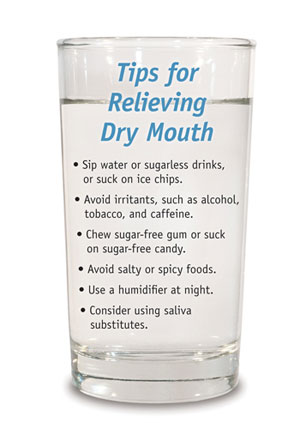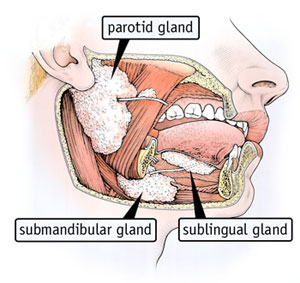Dry Mouth? Don’t Delay Treatment
On This Page:
Almost everyone’s mouth is dry sometimes. But if you feel like you have cotton in your mouth constantly, it may be time for treatment.
Dry mouth, known medically as xerostomia, occurs when you don’t have enough saliva, or spit, in your mouth.
Feeling stressed can trigger dry mouth temporarily. But a persistently dry mouth may signal an underlying disease or condition, so it’s important to see your doctor, says the Food and Drug Administration (FDA), which regulates products that relieve dry mouth.
And because dry mouth can lead to tooth decay, you should see your dentist, too, says John V. Kelsey, D.D.S., of FDA’s Division of Dermatology and Dental Products.
Dry mouth may make it difficult to speak, chew, and swallow, and may alter the taste of your food. It can also cause a sore throat, hoarseness, and bad breath.
Dry mouth can affect people of any age, but older people are especially vulnerable. “It’s not a normal consequence of aging,” says Kelsey. “Older people may take multiple medications that can cause dry mouth.”
According to the Surgeon General's Report on Oral Health in America, dry mouth is a side effect of more than 400 prescription and over-the-counter drugs, such as antidepressants, antihistamines, muscle relaxants, and high blood pressure medicines.
Other causes of dry mouth include:
- cancer treatments, such as chemotherapy and radiation of the head or neck
- hormone changes, such as those that occur during pregnancy or menopause
- health problems, such as HIV/AIDS, diabetes, and Sjögren’s syndrome, a disease in which a person’s immune system attacks the body’s tissues, including moisture-producing glands
- snoring or breathing open-mouthed
The Role of Saliva
Saliva is produced by three major glands in the mouth (salivary glands) and plays a key role in
- chewing, swallowing, and digesting food
- preventing infection in the mouth by controlling bacteria
- preventing tooth decay
“Saliva is mostly water, but it also contains enzymes and lubricants,” says Kelsey. “The enzymes help digest food and the lubricants make speaking, chewing, and swallowing more comfortable.”
Saliva helps control bacteria, which cling to the surface of teeth. They feed on sugar in the food we eat and break down and use (metabolize) the sugar to grow.
“A by-product of the metabolized sugar is acid, which starts to eat away at a tooth’s surface,” says Kelsey. Saliva neutralizes the acid and helps wash away food particles. If there is not enough saliva, cavities may occur.
Dry Mouth Treatments
Your doctor or dentist may recommend oral rinses and moisturizers, or prescribe an artificial saliva.
Also called saliva substitutes, artificial salivas are regulated by FDA as medical devices. “Unlike drugs, artificial salivas have no chemical action,” says Susan Runner, D.D.S., chief of FDA’s dental devices branch. “Their action is mechanical. They moisten and lubricate the mouth but do not stimulate the salivary glands to make saliva.”
While not a cure, artificial salivas can provide short-term relief of the symptoms of dry mouth. “They can also help minimize discomfort after an oral procedure,” says Runner.
Artificial salivas come in a variety of forms, including rinses, sprays, swabs, gels, and tablets that dissolve in the mouth. Some are available by prescription only; others can be bought over-the-counter.
FDA has also approved several prescription drugs to relieve dry mouth caused by certain medical treatments or conditions, such as Sjögren's syndrome and radiation for head or neck cancer.
Advice for Consumers
If you have persistent dry mouth:
- Talk to your doctor, who may change your medications or adjust the doses.
- Talk to your dentist and provide a list of the medicines you take as well as any medical conditions or treatments you’ve had. The American Dental Association recommends seeing your dentist at least twice a year.
Tips for Relieving Dry Mouth
- Sip water or sugarless drinks, or suck on ice chips.
- Avoid irritants, such as alcohol, tobacco, and caffeine. Remember that caffeine is found in many sodas as well as in coffee and tea.
- Chew sugar-free gum or suck on sugar-free candy.
- Avoid salty or spicy foods, which may irritate the mouth.
- Use a humidifier in your bedroom at night.
- Consider using saliva substitutes.
This article appears on FDA's Consumer Updates page, which features the latest on all FDA-regulated products.
May 9, 2011
Return to FDA Consumer Articles


